Brave leaders take risks that can make or break their organizations. Stupid ones just break stuff.
Venn and Why
Bravery is about taking action in spite of risk, facing potential consequences while pursuing a worthy objective. Stupidity is basically the same thing minus the worthy goal. The two overlap where the risk/reward is foolhardy.
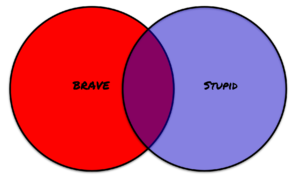
Corporate Bravery (or Stupidity)
CEO’s will “swing for the fences”, taking huge risks to earn huge rewards. Sometimes they take stupid risks with no upside. Tesla is a good example:
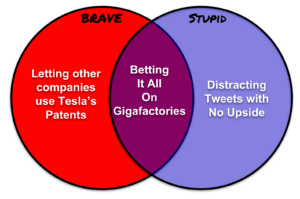
- Brave: Tesla opened up its patents to any company that wished to use them, at great risk, to encourage development of more electric vehicles across the industry.
- Stupid: During the Thai cave saga, Elon Musk insulted someone on Twitter. I’ll skip the details, but it was a huge distraction that hurt the Company. (Musk later apologized.)
- Brave and/or Stupid: The Gigafactories are a massive gamble for the relatively small automaker. They tie up huge amounts of capital. I think it’s brave. Short-sellers consider it stupid. Maybe we are both right.
Superman Is NOT Brave (Usually)
Bravery requires consequences. Superman rarely faces any. His life is almost never in danger. He can win a fist fight against an army, shrugging off artillery fire and missile blasts like raindrops. It takes no courage to face water pistol in a rainstorm. Superman only has skin in the game when Kryptonite is in the mix.
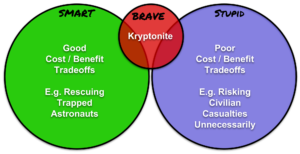
The Musk of Steel
It took nerves of steel to bet Tesla’s future on the Gigafactory. This was after the company nearly died in 2008 from previous high-risk bets. These moments of bravery took Tesla from a shaky startup to one of the most valuable auto companies in the world.
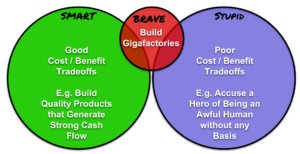
“Four or five moments — that’s all it takes to become a hero. Everyone thinks it’s a full-time job. Wake up a hero. Brush your teeth a hero. Go to work a hero. Not true. Over a lifetime there are only four or five moments that really matter.” – Colossus in the first Deadpool movie.
Worth It
With so many high-risk battles ahead, avoid instigating additional fights unless they are really, truly worth fighting for. Remember, it’s only “brave” when you’re likely to make progress towards a worthy goal. Nobody wins if you’re overwhelmed by consequences that could have been avoided. Politics is a common cause of self-inflicted corporate wounds.
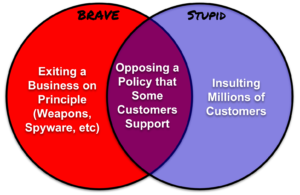
- Brave: Dick’s Sporting Goods publicly took a stand by discontinuing sales of certain types of weapons. Yes, it hurt sales, but that was a calculated trade-off.
- Brave and/or Stupid: Netflix has been accused of leaning left with some evidence to support that claim.
- Stupid: Executives lose customers, employees, and brand value when executives insult the people who vote differently, as GrubHub’s CEO did.
Brave and Smart are NOT the Same
- It’s smart to work productively towards objectives.
- It’s brave to accept risk in order to pursue objectives.
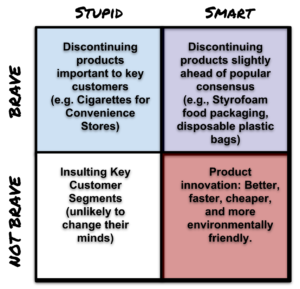
“Bad Guys” Can Be Brave, Too
In all conflicts, both sides call themselves “The Good Guys”. This is a recurring theme in history and fiction. Batman even tried to kill Superman.
Whatever bet you take, whatever cause you champion… You will face opposition who are fighting just as hard for “good” as they see it.
Maybe you achieve your goals. Maybe you lose. Maybe you alienate customers and emerge a smaller, weaker, less profitable company but you did some “good”. Pick your battles with your eyes open. Don’t be surprised at your story when the good guys don’t win and live happily ever.
The Time for Politics
“Avoid politics completely” is generally good advice: Trump/Clinton, Brexit, plastic straws, gender-exclusive bathrooms, tariffs, immigration, reproductive rights, fossil fuels, optimal tax policy… A good CEO doesn’t associate her/his company with any of these topics unless you have to. Even then, aim for damage control and “win win” approaches that respect all of your stakeholders to the extent possible.
Mind Your Minions
The CEO & board decide which battles to fight and which to avoid. Let’s say you run a “juice box” company, selling beverages to school children. You can no longer avoid the plastic straw issue. Governments and public opinion will now force expensive changes to your product design. Deal with this and move on.
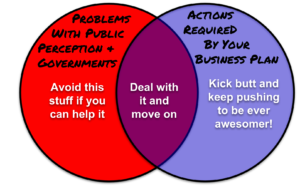
It would be a terrible time for your idealistic minions (aka staff) to pick additional battles. Some might launch a crusade against single-use disposable packaging. Others might lead a charge against sugar and artificial sweeteners. What if your sales reps advocated that children switch to tap water?
Yes, maybe the world would be a better place if all juice box drinkers switched to tap water starting tomorrow. But your juice box company would quickly go bankrupt. Keep your team focused on the right goals.
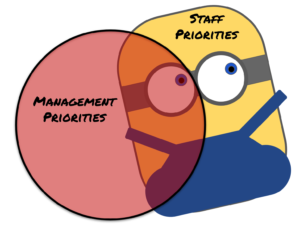
Pick Your Battles
There are always more causes to fight for. Balance today’s battles against your ability to bring change in the future. You’ll be able to do a lot more good with 100x as much capital if you grow your business.
Focus on building strong, valuable companies. Build ecosystems of investors, staff, customers, suppliers, and JV partners that share a passion for your business and are aligned in your goals. Play the long game, and you can move the world if you work smart and selectively brave.
Also: stay off Twitter.
IMPORTANT NOTE: If we do our job right, you won’t have any reason to know our views (if any) on just about every political issue… We are a business partner, not a debate partner (or opponent).